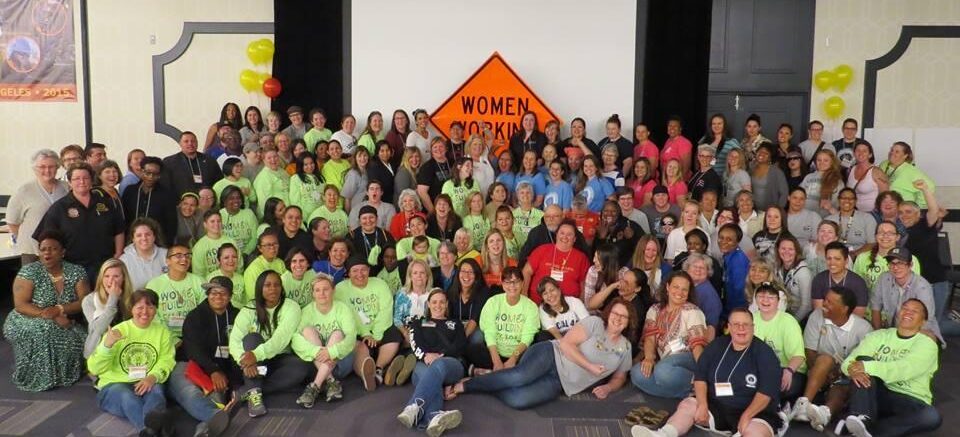Mission
The mission of the National Taskforce on Tradeswomen’s Issues, a project of Equal Rights Advocates, is to unite local, regional and national expertise and action to support tradeswomen and women in achieving access, opportunity, and equity in the construction industry, and other skilled trades occupations. The National Taskforce on Tradeswomen Issues does this through promoting a federal public policy platform and advocacy initiatives which includes efforts at the national level to improve, enforce, fund, and promote best practices in apprenticeship, training, workforce development, career tech, nontraditional employment, and job site equity.
Foundation of the Taskforce
In 2011, tradeswomen, allies, and advocates came together to form a coalition of organizations and individual members, including tradeswomen themselves, called The National Taskforce on Tradeswomen’s Issues, to address the lack of access, opportunity, and equity in the construction industry, and other skilled trades occupations. National women’s organizations, Legal Momentum and Wider Opportunities for Women co-chaired the coalition in its inception in 2011 through 2014, then Equal Rights Advocates replaced Legal Momentum as co-chair. Chicago Women in Trades replaced Wider Opportunities for Women as co-chair in 2015. Oregon Tradeswomen replaced Equal Rights Advocates in 2016.
TWTF Steering Committee Members
We are governed by an eleven-member volunteer Steering Committee, most with a lived experience of working in the trades. We are:
- Overall Co-Chairs
- Janelle DeJan, electrician and teacher from Women in New Orleans/Louisiana Skilled Trades and Manufacturing Careers
- Connie Ashbrook from Portland Oregon, founder and former Director of Oregon Tradeswomen and a former elevator constructor.
- Policy Committee Co-Chairs
- Meg Vasey, former Executive Director of Tradeswomen, Inc. in California and a former electrician
- Jessica Ramey Stender, Policy Director and Deputy Legal Director of Equal Rights Advocates in California.
- Tradeswomen Action Committee Co-Chairs
- Kelly McClellen, operating engineer from Kansas, active in Heartland Women in Trades and Tradeswomen Building Bridges
- Kristine Azzoli, restoration mason from New York,
- Crystal Herrera, electrician from Los Angeles
- Celena Barron, electrician from Los Angeles
- Communications Committee Co-Chair
- Jessenia Rivera, stationary engineer from New York
- At-large Steering Committee members
- Latisa Kindred, IBEW electrician from Chicago who is currently teaching electricity to high school students
- Nichole Foster, organizer with Jobs With Justice and a former Boilermaker.
Join us!
Our membership coalition is always looking to grow and engage more tradeswomen, allies, advocates, and industry partners! Sign up for the coalition by filling out the form below.
You must be signed into Google on your browser in order to fill out the form.
If you have any questions or need assistance, please send an email to: [email protected]
Taskforce members are encouraged to join one of our working committees below:
- Bi-Monthly Membership Meeting is held via Zoom on the third Monday of every odd month, starting at 3 pm PT/6pm ET.
- Monthly Policy Committee Meeting is held via Zoom on the second Thursday of each month at 2pm PT/5pm ET.
- Action Committee meets bi-monthly via zoom at 3:30pm PST/6:30 pm EST
- Communications Committee is held the third Friday every month, starting at 3 pm Pacific/6pm Eastern., please email Communications Chair Jessenia Rivera at [email protected]
Taskforce Members & Partners
The National Taskforce on Tradeswomen’s Issues, a project of Equal Rights Advocates, is a membership coalition of tradeswomen organizations, tradeswomen, and industry partners that strive to achieve access, opportunity, and equity for women in blue-collar careers.
Apprenticeship and Nontraditional Employment for Women (ANEW)
Building Pathways (Boston)
BC Centre for Women in the Trades
BC Tradeswomen Society
Chicago Women in Trades
DMV Tradeswomen
Equal Rights Advocates
Equitable Possibilities in Construction (EPIC) at Colorado Jobs With Justice
Hard Hatted Women
Heartland Women in Trades
Institute for Women’s Policy Research
International Native Women in Trades
Minnesota Tradeswomen
Missouri Women in Trades
National Center for Women’s Equity in Apprenticeship and Employment
National Partnership for Women and Families
National Women’s Law Center
Nevada Women in Trades
NOLA Women in Skilled Trades and Manufacturing Careers
Northeast Center for Tradeswomen’s Equity
Nontraditional Employment for Women (NEW)
Oregon Tradeswomen
Policy Group on Tradeswomen Issues
Rhode Island Women in Trades
Sisters in the Building Trades
Sisters in the Brotherhood
Texas Women in Trades
T.R.A.D.E.
Tradeswomen, Inc.
Tradeswomen Building Bridges
Vermont Works for Women
West Virginia Women Work
Women in Construction
Women in Non Traditional Careers (WINC)
Women in Non-Traditional Employment Roles (WINTER)

